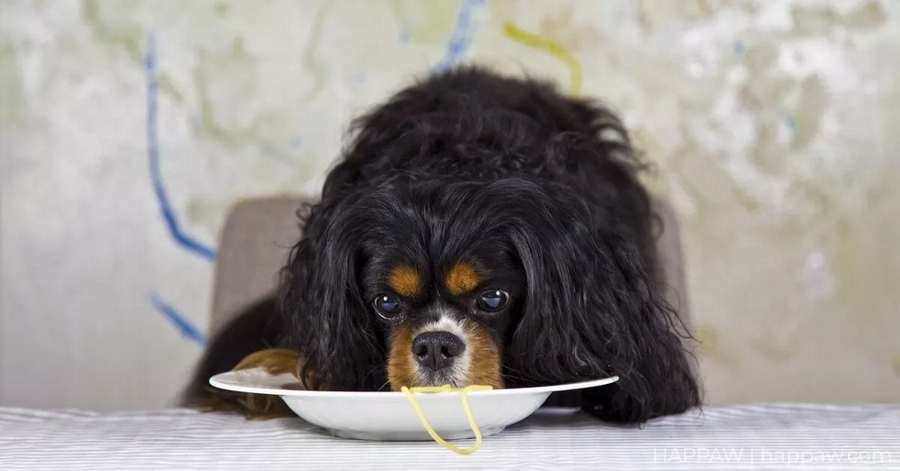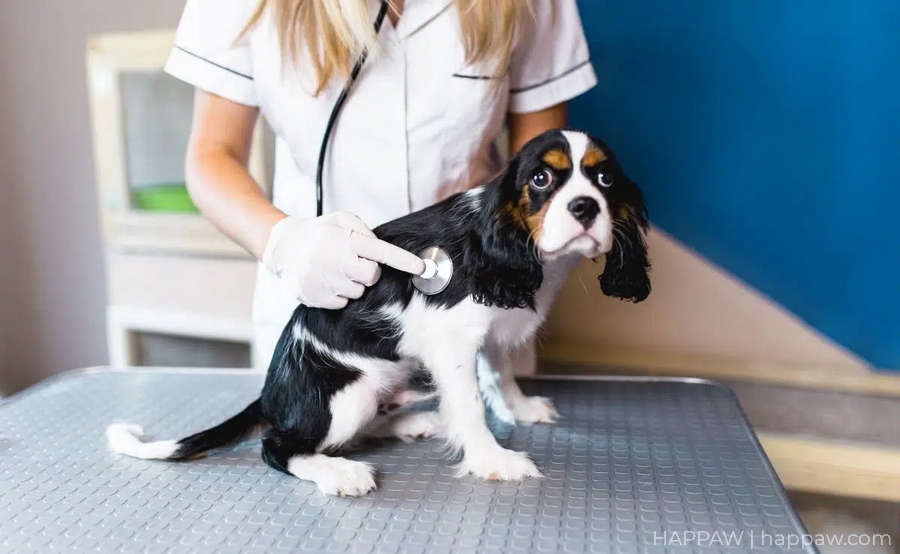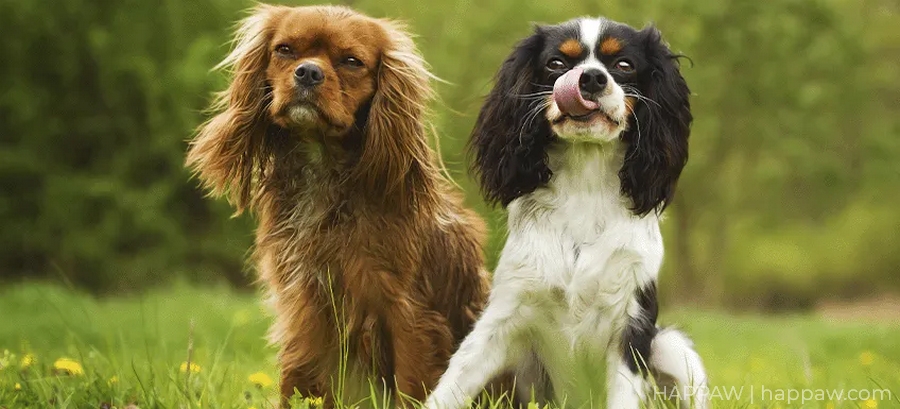Our furry friends’ health and well-being are always a top priority in the world of pet ownership. It’s normal for us to be anxious when we find our beloved Cavalier King Charles Spaniel growing in size unexpectedly. The article below dives into the reasons behind the commonly question:
Why is my Cavalier King Charles Spaniel so big?
Understanding the factors that contribute to their weight is critical not just for their health but also for living a happy and full life together.

Cavalier King Charles Spaniel, sometimes known as “Cavvy,” is a lovely and lovable little breed recognized for its attractive appearance and friendly disposition. Their expressive eyes and beautiful ears have captured the hearts of numerous dog lovers all around the world. Despite their little stature, they have a wonderful personality that makes them lovely pets.
Cavalier King Charles Spaniel Growth Chart
| Age | Estimated Weight | Estimated Height |
|---|---|---|
| Week 1 | 0.5-0.7 Ibs | 0.5 inches |
| Week 2 | 1-1.2 Ibs | 0.5-0.7 inches |
| Week 3 | 1.2-1.5 Ibs | 1-1.2 inches |
| Week 4 | 1.5-2.5 Ibs | 1 .5-1.7 inches |
| Week 5 | 2.5-3 Ibs | 2.5 inches |
| Week 6 | 2.9-3.8 Ibs | 3 inches |
| Week 7 | 3.5-4.5 Ibs | 3.5-3.8 inches |
| Week 8 | 4-5.2 Ibs | 4-5 inches |
| 3 Months | 6.5-8.5 Ibs | 7.5-8 inches |
| 6 Months | 10.5-14 Ibs | 11-12 inches |
| 8 Months | 12.5-16 Ibs | 11.8-12.8 inches |
| 10 Months | 12.7-17 Ibs | 12-13 inches |
| 12 Months | 13-17.5 Ibs | 12-13 inches |
| 16 Months | 13-18 Ibs | 12-13 inches |
| Adulthood | 13-18 Ibs | 12-13 inches |
We shall begin on a trip to solve the mystery of why some Cavalier King Charles Spaniels appear larger than expected throughout this detailed post. We will look at five key aspects that can determine their size, offering insight on the subtleties of their development. We hope to provide you with a comprehensive grasp of this fascinating area of your pet’s existence, including everything from overfeeding to genetic predispositions.
Overfeeding as a Factor
In the context of canine nutrition, overfeeding is defined as feeding your dog an excessive amount of food that exceeds their nutritional demands. This behavior can have a number of negative implications, including unwanted weight gain, obesity, and other health difficulties. Recognizing and managing indicators of overfeeding is critical for your Cavalier’s general health.
Precision portion management is an important element in keeping a Cavalier King Charles Spaniel at a healthy weight. Measuring their food precisely allows you to deliver the appropriate quantity of nourishment while avoiding overconsumption. It’s a simple yet efficient method for keeping them at their peak size and vigor.

The quality of the food you provide your pet is critical to their overall health. It is critical to choose high-quality dog food that is tailored to their unique needs. These foods are designed to supply your Cavalier with the vitamins, minerals, and nutrients he or she needs for a healthy development.
Treats are a lovely way to communicate your love or to reward your Cavalier for excellent behavior. Excessive treat-giving, on the other hand, might contribute considerably to overfeeding. We’ll talk about how to create a balance between treating your pet and keeping their diet under control.

Garret Woodward
Experienced Dog Trainer
Lack of Exercise
Regular exercise is essential for our Cavalier King Charles Spaniels to maintain a healthy weight. It is not just important to keep kids physically healthy; it is also important to promote their general well-being. Exercise aids in the burning of calories, the strengthening of muscles, and the mobility of joints. Furthermore, it fosters mental stimulation, ensuring that your pet is happy and active.
Consider implementing daily workout activities into your Cavalier’s regimen to maintain them in peak condition. Despite their diminutive size, these pups are full of energy and passion. A brisk stroll, interactive playtime, or a game of fetch are all great methods to keep them moving. Regular exercise also helps to prevent weight gain and other health problems.
Read Also: Why Is My Cavalier King Charles Spaniel So Small?
Despite their small stature, Cavalier King Charles Spaniels are extremely active. They like partaking in many activities with their owners and thrive on physical exertion. Their diminutive size should not be misinterpreted as frailty; these dogs are strong and agile, making them great companions for both families and individuals. Maintaining their size and health requires harnessing their natural activity level.
Genetics and Size
The size of a dog, particularly Cavalier King Charles Spaniels, is determined by genetics. The genes passed down from parents and ancestors determine a dog’s size. Understanding these hereditary elements helps to understand why certain Cavaliers may differ in size from the breed standard. It is critical to recognize that genetics alone can contribute to size variances within the breed.
Inherited characteristics, like as size, are essential to a breed’s standard. Breed standards for Cavalier King Charles Spaniels specify the optimal size range and physical traits that differentiate them. Size variations might develop as a result of the interaction of inherited features from previous generations. Responsible breeders adhere to these guidelines in order to preserve the breed’s identity and produce healthy, well-sized pups.
Responsible breeding is critical to preserving the breed’s features, especially size. Breeders with a good reputation carefully select breeding couples based on breed criteria and health factors. They want to breed puppies that are within set size ranges and exhibit the breed’s defining characteristics. As owners, we can help the breed by encouraging ethical breeding and selecting breeders who value the health and growth of Cavalier King Charles Spaniels.
Age-Related Changes
Our Cavalier King Charles Spaniels’ metabolism naturally alters as they age. If they do not make dietary changes, their bodies may become less efficient at burning calories, resulting in weight increase. Understanding these metabolic alterations is critical for providing proper care to our elderly partners.
Senior Cavalier King Charles Spaniels’ diet must be adjusted to reflect age-related metabolic changes. Senior-specific dog diets are available, which are designed to fulfill the nutritional demands of aged canines. These foods promote weight control, joint health, and overall vitality, ensuring that our senior pets remain in peak condition.
Cavalier King Charles Spaniels have given us years of company, and as they age, they require specific care to preserve their quality of life. Regular veterinary check-ups, adjusted nutrition, and reduced exercise routines are all part of age-appropriate care. We can assist elderly Cavaliers mature gracefully while keeping a healthy size and weight by addressing their individual demands.
Medical Concerns
King Charles the Cavalier Spaniels, like any other breed, are prone to a variety of medical issues that can lead to weight gain. Hypothyroidism and Cushing’s disease are two significant disorders. Hypothyroidism is a condition in which the thyroid gland does not generate enough hormones, resulting in a slowed metabolism and probable weight gain. Cushing’s disease, on the other hand, is characterized by an excess of cortisol, which can lead to weight gain. Pet owners must be mindful of these circumstances and their impact on a dog’s size.

Both hypothyroidism and Cushing’s illness can upset a dog’s hormonal balance, impacting metabolism and appetite control. Despite following their normal diet, dogs with hypothyroidism may experience decreased energy levels and an increased inclination to acquire weight. Cushing’s illness can cause increased hunger and, as a result, overeating. These medical diseases highlight the necessity of frequent veterinary check-ups in detecting and addressing potential problems.
Regular veterinary examinations are an essential component of good pet ownership. Veterinarians can monitor your Cavalier King Charles Spaniel’s health, discover any underlying medical concerns, and provide prompt interventions during these appointments. Schedule routine check-ups and discuss any concerns you may have with your veterinarian to preserve your pet’s size and overall well-being.
FAQ
How big can a Cavalier King Charles get?
A Cavalier King Charles Spaniel can typically weigh between 13 and 18 pounds and grow up to 13 inches when fully grown.
What is the bigger version of the Cavalier King Charles Spaniel?
There isn’t a “bigger version” of the Cavalier King Charles Spaniel within the same breed. They have a standard size range.
How do I know if my Cavalier is overweight?
You can determine if your Cavalier is overweight by assessing its body shape, checking for rib visibility and fat pads, observing behavior changes such as reduced activity, and consulting a veterinarian for a professional evaluation.
Conclusion
Finally, the size of Cavalier King Charles Spaniels is determined by a variety of factors such as overfeeding, lack of activity, genetics, age-related changes, and potential medical concerns. These factors can have a considerable impact on whether your beloved pet maintains a healthy weight or develops weight-related issues.

Responsible pet ownership requires not just providing love and company, but also ensuring the health and well-being of your Cavalier King Charles Spaniel. It entails carefully controlling their food, being active, and remaining alert to any potential health risks. You may help your pet live a longer and happier life by being a responsible owner.
If you have any concerns regarding the size, health, or temperament of your Cavalier King Charles Spaniel, seek professional guidance from a veterinarian. They are your finest resource for dealing with any problems or issues that arise during your pet parenting adventure.